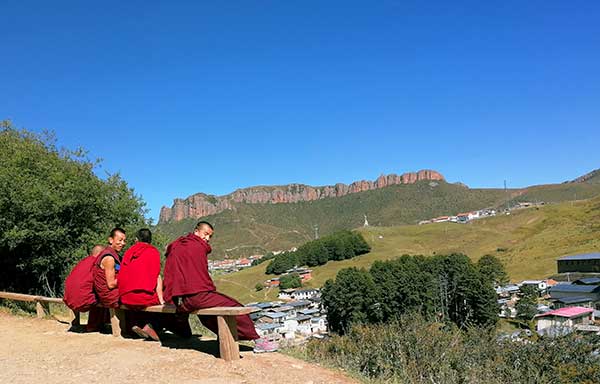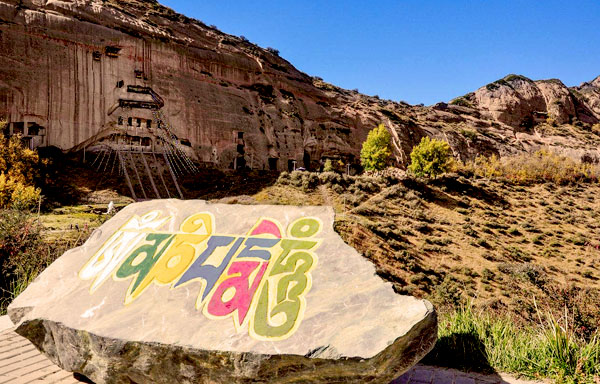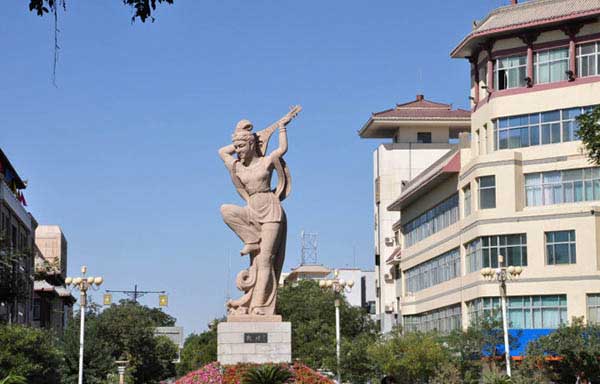- By admin
- In HistoricalFigures
- 2017-12-14
Zhang Qian—The Father of the Silk Road
 In the Western Han dynasty, the western regions, in a narrower sense, means the area to the west of Yumenguan and Yang guan (to the east of Dunhuang, Gansu province), to the east of Congling, to the north of the Kunlun Mountains, to the south of Lake Balkhash. In a broader sense, it covers central Asia and The Roman Empire to the east of Congling, including the area now known as Afghanistan, Iran, Uzbekistan and countries along the Mediterran.
In the Western Han dynasty, the western regions, in a narrower sense, means the area to the west of Yumenguan and Yang guan (to the east of Dunhuang, Gansu province), to the east of Congling, to the north of the Kunlun Mountains, to the south of Lake Balkhash. In a broader sense, it covers central Asia and The Roman Empire to the east of Congling, including the area now known as Afghanistan, Iran, Uzbekistan and countries along the Mediterran.
The western regions are divided into two parts by Mount Heaven; most of the habitants lived around Tarim Basin. In the early years of Western Han dynasty, there were “thirty-six countries”: on the southern edge of the basin, there were Loulan (now known as Shanshan county near Nepal), Guqiang, Qiemo, Yutian (now known as Hetian in Xinjiang Province), and Shache, which were habitually referred to as the southern countries. On the northern edge there were Gushi(Now known as Anterior Cheshi and further Cheshi in the turpan basin), Weili, Suyab, Qiuci(now known as Kuqa), onsu, Gumo(Aksu in Xinjiang Province), Shule(kashkar) etc, which were called “the northern countries”. At the foot of the Mount of Heaven, there were anterior Pue and further pue, which were of the same size. They are not large, mostly consisted of deserts and oasis, valleys and basins. The population there is not large, either. The average population is twenty or thirty thousand.
At that time, the Kushans were a normadic tribe living in the Ili River basin. It was a famous ‘moving country’ with a population of 400,000 people. They once lived between Dunhuang and Qilian Mountain. After being repeatedly defeated by Xiongnu, they had just moved here. However, Xiongnu killed their king and made a wine container with his skull, which made the Kushans their enemy for generations.
The Han dynasty became stronger day by day, they were planning to fight against the threat of Xiongnu to the northern areas. Emperor Wu heard about the story of the Kushans and wanted to cooperate with them. But Gansu Corridor can only be reached through the Gansu Corridor, which was still under the control of Xiongnu. That’s why Emperor Wu decided to recruit a man that can travel as an envoy to the western regions.
In the third year of Emperor Wu’s reign, which was 138 BC, Zhang Qian was recruited as Lang and set out to meet the Kushans. Lang was the aide to the Emperor who did not have specific tasks and would be trusted with important matters when they were needed.
Zhang Qian lived in Cheng, Hanzhong. He was a man of strong willpower, flexible and broad-minded. He was detained by Xiongnu on his way and was kept there for more than ten years, but he always remembered his job as a special envoy. The Chanyu made him marry a local girl, who later gave birth to a son, but he never wavered in his determination to complete the task. He lived in the western territory and waited for the chance to escape.
Finally the chance came; he led his subordinates and escaped. They ran eastward for some ten days, crossed Congling, arrived in Ta-Yuan(in Uzbekistan), and then in kangju (in the southeast of Kazakhstan) and in the end in Daxia, which is in the drainage area of Amu-Dar'ya. It was then that Zhang Qian finally found the Kushans. For more than ten years, the moving country witnessed great changes. First it was attacked by Wusun by the Side of the Yili River and moved further to the west. Wusun was also a ‘moving country’ with a population of 630,000. It was once a nomadic country in Dunhuang and was attacked by the Kushans. Later, Wusun gained the support of Xiongnu and attacked the Kushans, which was forced to move to the side of Amu-Dar'ya. Wusun, instead, stayed by the side of Yili River. Since the Kushans moved to the side of Amu-Dar'ya, it conquered Daxia with force. The fertile foil here made them change to farmers. They had no intention to go back and fight the Xiongnu.
Zhang Qian stayed with them for over a year, trying to talk them into cooperating so he had to go back. On his way back, he was again detained by the Xiongnu for over a year. In 126 BC, a riot broke up in among the Xiongnu, providing Zhang Qian an opportunity to escape. He went back to Chang’an. Zhang Qian took more than 100 people with him when he left. When he came back thirteen years later, he had only Tangyifu with him. Though he did not bring about the desired result, he gained a thorough understanding of the geography, the natural resources and the customs in the western regions, providing important materials for the Han dynasty to make a road to central Asia.
After Zhang Qian returned, he made a report to Emperor Wu on the western regions, which is the origin of chronicles of the Han dynasty—story of the western regions. Afterwards, Zhang Qian went to war with Wei Qing and did a great service. He knew ‘where the army should stop to rest’, so he was dubbed ‘the Marquis of vision’ by Emperor Wu.
In the fourth year of Yuanshou(119 BC), Zhang Qian set out for the western region for the second time. In this year, Emperor Wu had conquered the Hosi Corridor, and was fighting the biggest war against Xiongnu. Emperor Han often asked Zhang Qian about the situation in Daxia and other regions. Zhang Qian focused on the conflicts between Wusun and Xiongnu and recommended to Emperor Wu to call on Wusun to return to Dunhuang and work with Han to fight against Xiongnu. This is the famous strategy of “cutting the right arm of Xiongnu.” At the same time, Zhang Qian also proposed that Han should promote amicable exchanges with countries in the western regions. Emperor Han took on board his proposals.
Zhang Qian led a group of 300 people, each equipped with two horses, took tens of thousands of cows and sheep and a lot of valuable materials as a present to the king of Wusun, but he didn’t persuade him return to Dunhuang. Then he sent his subordinates as envoys to Dayuan,Kangju, Rouzhi and Daxia. In the second year of Yuanding(115 BC), Zhang Qian returned to Chang’an with scores of envoys sent by Wusun. Later, the envoys also went to Parthia (now known as Persia), Sindhu (now known as India), Aorsi (between Aral sea and Caspian Sea), Antiochia (the subject states of Parthia), Lishuan(Alexandria of Egypt that belongs to the Qin Empire). The Chinese envoys were warmly received by a group of twenty thousand people especially organized by Parthia. Envoys from Parthia also went to Chang’an for a visit or for trade. From then on, exchanges were built between Han and the western regions.
In the second year of Yuanding (115 BC), Zhang Qian went back to Han and was made foreign minister. He died the next year, but the relations between Han and the western regions further developed. In the sixth year of Yuanfeng (105 BC), the king of Wusun offered Han thousands of horses as betrothal gifts. Emperor Wu married to him Xijun—the princess of Jinagdu. After Xijun died, the granddaughter of the king of Chu, Princess Joy was married to the King of Wusun. The waiter of Princess Joy, Feng Liao, knew a lot about poems and had a way with people. She often bestows presents to the countries and was highly respected. She was called “Mrs. Feng”, and because of “Mrs.Feng” and her activities, the relation with Wusun was strengthened.In the third year of Shenjue(60 BC),Xiongnu fell apart, their king surrendered to Han, losing its control over the Han dynasty. Emperor Xuandi the Western Regions Frontier Command was established in Wulei(in east Luntai in Xinjiang). This was the first administrative post set to the east Congling and to the south of Balkhash lake.
The Xiongnu slave holder had been exploiting and oppressing the people in the western regions. The feudal system in Western Han dynasty was much more advanced than the slavery system of Xiongnu. So, the people of all ethnic groups in Xinjiang hoped to break away from the aristocracies of Xiongnu and accept the rule of Western Han dynasty. The government appointed officials there and sent soldiers to open up wasteland. Commandants were also set there to protect the field. These made the relationship between different ethnic groups closer than ever.
The Han dynasty began contact with the western regions for military reasons, but it had more than just military influences. It blazed a trail through Yumen pass, from Dunhuang to Xinjiang. It also linked Xinjiang with Central Asia. This road was later called ‘Silk Road’, which linked the Han dynasty with a lot of countries in Central Asia, promoting economic and cultural contacts between them. The feudal governments in Chinese history called the ethnic groups “YI”, so Zhang Qian’s visit was the first contact between China and Yi. More then ten species of plants, such as Walnut, grape, pomegranate, horse bean and clover was grown in the central plains. The songs in Qiuci and musical instruments like urheen enriched the life of the Han people. The army based in Shanshan and Cheshi used karez to open up the wasteland, which was promoted in these regions. What’s more, the famous Sweating Blood horse of Dawan, which was also called ‘horse from heaven’ was very popular among the envoys. Also, the countries ranging from Dawan to Anxi did not produce silk or cast iron, These skills were exported to these countries from the Han dynasty, which made a significant contribution to promoting civilization.
Related destinations
Why Choose Us?
We are the top Silk Road tour operator based in Dunhuang, China. We focus on providing well designed Silk Road China Tours with resonable price and thoughtful service.
- Easy & carefree booking
- The best value
- Great travel experience
- Locally operated
Hot Tours
-

6 days Gansu tour to Binglingsi, Xiahe and Langmusi
Tour type : Private tour Price : from *** Destinations : Lanzhou - linxia - Xiahe - Langmusi - Hezuo - Lanzhou -

12 Days Gansu Highlights Tour
Tour type : Private tour Price : from *** Destinations : Xian – Tianshui – Lanzhou – Xiahe – Langmusi – Hezuo – Zhangye – Jiayuguan - Dunhuang -

10 Days Silk Road Classic Tour
Tour type : Private tour Price : from *** Destinations : Xian - Zhangye - Jiayuguan - Dunhuang - Turpan - Urumqi -

5 Days Zhangye - Alxa youqi Highlights Tour
Tour type : Private Tour Price : from *** Destinations : Zhangye - Alax youqi - Zhangye


